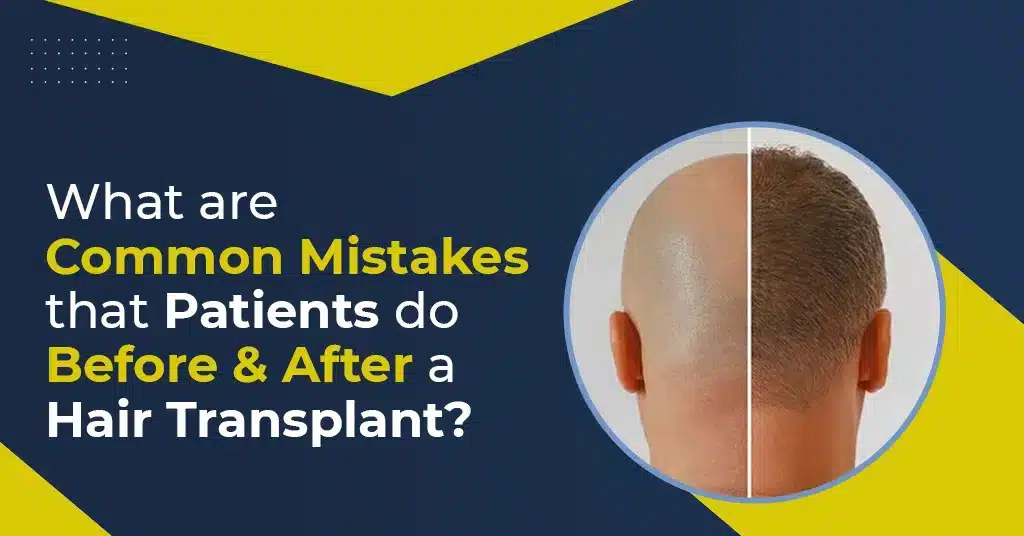Hair loss, a prevalent condition caused by various factors including stress and genetics, has led both men and women to consider hair transplants as a viable solution. This procedure offers the promise of regaining lost hair and boosting self-confidence. However, before and after undergoing a hair transplant Surgery in Varanasi or in general also, patients often make mistakes that can impact the hair transplant Before & after results. Understanding these mistakes and taking precautionary measures is essential for achieving a successful outcome.
Before a Hair Transplant:
- Insufficient Research: One common mistake patients make is failing to conduct thorough research before selecting a hair transplant surgeon and clinic. It is crucial to delve into the surgeon’s credentials, success rates, patient reviews, and clinic reputation to ensure a skilled and trustworthy professional.
- Unrealistic Expectations: Patients must have realistic expectations about the outcome of the procedure. Open communication with the surgeon during the consultation is vital for understanding what can realistically be achieved through the surgery.
- Incomplete Medical History Disclosure: Omitting pertinent medical information, such as underlying health conditions and medications, can hinder the surgeon’s ability to make informed decisions about the procedure’s suitability and plan accordingly.
- Smoking and Alcohol Consumption: Engaging in excessive smoking and alcohol consumption before the surgery can impair blood flow and hinder the healing process. Patients should refrain from these habits in the weeks leading up to the procedure.
- Disregarding Preoperative Instructions: Hair transplant clinics provide detailed preoperative guidelines to optimize the surgical outcome. Neglecting these instructions may lead to complications during or after the surgery.
After a Hair Transplant:
- Graft Mishandling: Patients should avoid touching, scratching, or picking at the transplanted area to prevent dislodging grafts and hindering the healing process. Adhering to the surgeon’s postoperative instructions is crucial.
- Non-Compliance with Medication: Surgeons often prescribe antibiotics, painkillers, or topical treatments post-surgery to expedite healing and prevent infection. Failure to adhere to the prescribed medication regimen can compromise the recovery process.
- Neglecting Postoperative Care: Strenuous activities, heavy lifting, and intense exercises should be avoided for a specific period after the surgery to prevent damage to the grafts. Following the surgeon’s guidelines on physical activity is essential.
- Impatience with Results: Hair transplant outcomes take time to manifest fully. Patients must understand that hair growth is a gradual process and not expect immediate results.
- Water-Related Activities: Immersion in water, such as swimming or bathing in pools and hot tubs, should be avoided for a few weeks post-surgery to prevent infection and slow down healing.
- Extreme Hair Styling: Patients should refrain from using harsh hair treatments on the transplanted hair for a specified time to avoid irritating the grafts and scalp.
Precautions Before and After a Hair Transplant:
Before the Procedure:
- Surgeon Consultation: Schedule a consultation with a reputable and experienced hair transplant surgeon or hair Transplant clinic to discuss your goals and assess your candidacy for the surgery.
- Thorough Research: Choose a renowned clinic with a track record of successful procedures and satisfied patients. Look for reviews, credentials, and before-and-after pictures.
- Follow Preoperative Instructions: Strictly adhere to the preoperative guidelines provided by the clinic, including medication, nutrition, and lifestyle modifications.
- Medical History Disclosure: Share your complete medical history, including medications and past surgeries, with the surgeon to ensure proper planning.
- Minimize Alcohol and Smoking: Reduce alcohol consumption and quit smoking in the weeks leading up to the surgery to optimize healing.
After the Procedure:
- Follow Postoperative Instructions: Abide by the surgeon’s detailed postoperative instructions, including medication usage, hair care, and activity restrictions.
- Protect Grafts: Prevent graft damage by refraining from touching or exposing the transplanted area to harsh sunlight. Consider wearing a hat or using high SPF sunscreen.
- Proper Cleaning and Care: Clean and care for the transplanted area as instructed by the surgeon, using specialized shampoos or solutions as recommended.
- Medication Adherence: Take prescribed medications, such as antibiotics and pain relievers, as directed by the surgeon to promote healing and prevent infection.
- Avoid Strenuous Activities: Refrain from vigorous activities, heavy lifting, and exercises that raise blood pressure for the recommended duration to protect the grafts.
- Follow-up Appointments: Attend scheduled follow-up appointments to allow the surgeon to monitor progress and provide additional guidance for optimal healing and hair growth.
Key takeaways
In conclusion, a successful hair transplant requires careful consideration, thorough research, and strict adherence to pre- and postoperative instructions. Patients must set realistic expectations, be transparent with their surgeons, and prioritize their well-being during the recovery period. By avoiding common mistakes and taking necessary precautions, individuals can increase their chances of achieving the desired results and restoring their self-confidence. If you’re considering a hair transplant, consult a skilled and reputable Hair transplant surgeon like the experts at Marvelous Aesthetics, who prioritize patient education and provide comprehensive guidance throughout the process.

